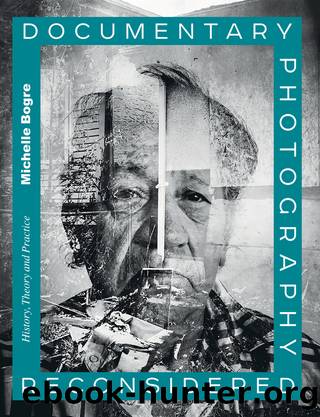Documentary Photography Reconsidered;HISTORY, THEORY AND PRACTICE by MICHELLE BOGRE

Author:MICHELLE BOGRE
Language: eng
Format: epub
Publisher: Routledge
Published: 2019-09-15T00:00:00+00:00
Focus On Practice Conversation with Ron Haviv, New York, NY
Ron Haviv, a cofounder of the photo agency VII, is an Emmy-nominated and award-winning photojournalist whose career has focused on documenting conflict and raising awareness about human rights issues around the world. Haviv’s seminal work from the Balkans was used as evidence to help indict and convict war criminals at the international tribunal in The Hague.
MB: How would you define documentary?
RH: For me documentary is always going to have some relationship to the word “document,” which is an actual object—something that is verifiable and a representation of the truth. When I look at something labeled documentary photography and/or photojournalism I am expecting work by a photographer trying to represent the situation in a correct manner. That being said, if the photographer has the option or ability to have portraiture or their own aesthetic applied, as long as that is very transparent and above-board, that can be documentary too. So, using portraiture as an example, I have absolutely no problem with portraiture being a very strong part of documentary as long as the photographer says that this is a portrait, so I know that there’s been an interaction between the photographer and the subject. I think that documentary should represent to the reader that it is coming from a place of truthfulness.
MB: That’s a very sticky word: truthfulness. You said two things, correct and truthfulness. I heard Marcus Bleasdale reply to an accusation that photographs aren’t truth, “I’m not telling the truth, but I’m telling a truth as best as I can to represent a situation.”
RH: I would agree with Marcus on that and I would also say that part of my interaction as a viewer is understanding the photographer, trusting their integrity, and what they’re trying to say and how they’re trying to say it. As a photographer, I believe that photography is not objective. It is subjective by its very nature, but that being said, there are lines that shouldn’t be crossed, and it is important for all photographers who work within those lines to have the ability to defend their work by saying: “This is what I saw, this is my interpretation of it, this is a truthful representation of this scene, this idea through my eyes through my aesthetic,” and then the reader is left to judge.
MB: What lines shouldn’t be crossed today? And do you think those lines have changed in the past 25 years?
RH: I am a self-taught photographer, learning from my peers such as Christopher Morris, James Nachtwey, and Gilles Peress. Those were the people who I spent my formative years as a photographer traveling with, working with, learning at their side. I think all three of them are similar, but using Jim as an extreme, I would watch how he worked, standing, waiting for everything to come together for the vision he wanted, and not speaking to people, not doing anything. I think the idea that a photographer should influence the scene as little as possible remains incredibly important today.
Download
This site does not store any files on its server. We only index and link to content provided by other sites. Please contact the content providers to delete copyright contents if any and email us, we'll remove relevant links or contents immediately.
Shoot Sexy by Ryan Armbrust(17141)
Portrait Mastery in Black & White: Learn the Signature Style of a Legendary Photographer by Tim Kelly(16484)
Adobe Camera Raw For Digital Photographers Only by Rob Sheppard(16387)
Photographically Speaking: A Deeper Look at Creating Stronger Images (Eva Spring's Library) by David duChemin(16161)
Bombshells: Glamour Girls of a Lifetime by Sullivan Steve(13108)
Art Nude Photography Explained: How to Photograph and Understand Great Art Nude Images by Simon Walden(12348)
Perfect Rhythm by Jae(4621)
Pillow Thoughts by Courtney Peppernell(3395)
The Book of Joy by Dalai Lama(3217)
Good by S. Walden(2915)
The Pixar Touch by David A. Price(2739)
Fantastic Beasts: The Crimes of Grindelwald by J. K. Rowling(2543)
A Dictionary of Sociology by Unknown(2518)
Humans of New York by Brandon Stanton(2379)
Read This If You Want to Take Great Photographs by Carroll Henry(2303)
Stacked Decks by The Rotenberg Collection(2270)
On Photography by Susan Sontag(2130)
Photographic Guide to the Birds of Indonesia by Strange Morten;(2088)
Insomniac City by Bill Hayes(2083)
